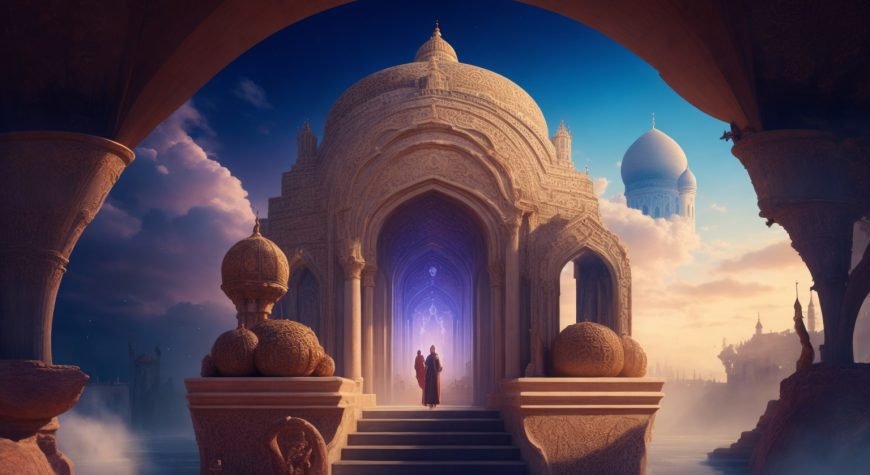Exploring the Afterlife: Beliefs and Beyond

Introduction
The concept of the afterlife has captivated human imagination for millennia. It is a topic steeped in mysticism, spirituality, and cultural significance, transcending religious boundaries. Whether you’re a devout believer or a curious skeptic, the idea of what happens after death continues to inspire contemplation and curiosity. In this article, we embark on a journey to explore the various beliefs and perspectives on the afterlife, delving into its cultural, religious, and philosophical dimensions.
The Multifaceted Nature of the Afterlife
1. Universal Intrigue
The afterlife is a universal theme that has intrigued humanity across time and cultures. We begin by acknowledging its broad appeal and why it remains a fundamental question for many.
2. The Role of Culture
How does culture shape our beliefs about the afterlife? We explore the influence of cultural context on our conceptions of life beyond death.
Religious Perspectives
3. Christianity: Heaven and Hell
In Christianity, the afterlife often revolves around the concepts of heaven and hell. We delve into the Christian perspective on salvation and damnation.
4. Islam: The Journey of the Soul
Islam offers a unique perspective on the afterlife, emphasizing the journey of the soul and the Day of Judgement.
5. Hinduism: Reincarnation and Karma
Hinduism introduces the idea of reincarnation and the intricate web of karma that influences one’s fate in future lives.
6. Buddhism: The Path to Nirvana
Buddhism delves into the afterlife through the lens of attaining Nirvana, the ultimate liberation from suffering.
7. Judaism: Sheol and Olam Ha-Ba
Jewish beliefs include Sheol, a realm of departed souls, and Olam Ha-Ba, the World to Come.
Philosophical Reflections
8. Existentialism: The Absurdity of Life
Existentialist thinkers like Jean-Paul Sartre and Albert Camus contemplated the absurdity of life and the question of what follows.
9. Secular Humanism: A Legacy of Human Influence
Secular humanism offers a non-religious perspective on the afterlife, focusing on the enduring legacy individuals leave behind.
Near-Death Experiences
10. Accounts from the Brink
Near-death experiences provide anecdotal evidence of glimpses into the afterlife. We explore these compelling accounts.
Scientific and Skeptical Views
11. Neuroscience and Consciousness
Scientific inquiry into consciousness and the brain raises questions about the existence of an afterlife.
12. Skepticism and Atheism
Skeptics and atheists challenge the concept of an afterlife, advocating for a naturalistic worldview.
Beyond Belief: Cultural Traditions
13. Ancestral Worship
Many cultures practice ancestral worship, believing in continued connections with departed loved ones.
14. Dia de los Muertos: Day of the Dead
The Mexican holiday Dia de los Muertos offers a vibrant celebration of deceased ancestors.
Conclusion: Embracing the Mystery
As we conclude this exploration of the afterlife, one thing becomes clear: the mystery endures. Beliefs about what lies beyond death are as diverse as the human experience itself. Whether rooted in faith, philosophy, or science, our understanding of the afterlife is a testament to the boundless human imagination and the enduring quest for meaning.
FAQs (Frequently Asked Questions)
- Is there scientific evidence of an afterlife? No conclusive scientific evidence exists to prove or disprove the existence of an afterlife, making it a matter of faith and belief.
- Do all religions have beliefs about the afterlife? Most major religions have some form of belief or doctrine concerning the afterlife, but these beliefs vary widely.
- Can one’s cultural background influence their beliefs about the afterlife? Yes, cultural background often plays a significant role in shaping an individual’s beliefs and perceptions of the afterlife.
- What is the significance of near-death experiences in understanding the afterlife? Near-death experiences provide personal accounts that have fueled debates and discussions about the nature of the afterlife.
- Is it possible for individuals to hold multiple or conflicting beliefs about the afterlife? Some individuals may integrate elements of various belief systems or hold ambivalent views on the afterlife, reflecting the complexity of human spirituality.


One Comment
Breaking the Stereotypes: Addressing Islamophobia in the Western Media - Islamic Guide
September 30, 2023 AT 7:13 PM[…] One effective way to promote cultural understanding is through accurate and balanced representation of Muslims and Islam. The media should strive to depict the diversity within the Muslim community, highlighting the various cultural, ethnic, and religious practices that exist. Avoiding generalizations and refraining from sensationalizing news stories can help prevent the perpetuation of stereotypes. […]